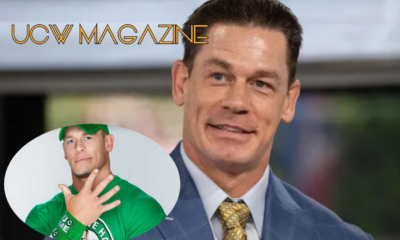In The Pages
The “Fake It Till You Make It” Mindset, a Double-Edged Sword in Business

In the world of entrepreneurship and innovation, the mantra “Fake it till you make it” has become both a rallying cry and a cautionary tale. While it can inspire boldness and vision, it also has the potential to lead to devastating consequences. The distinction between success and failure often boils down to what happens after the initial bluff?
Do you put in the hard work to deliver, or do you collapse under the weight of unmet promises?
The Power of Perception
The concept of “faking it” isn’t inherently negative because, at its core, it’s about projecting confidence in a vision that hasn’t yet fully materialized. In the high-stakes world of business, perception often drives reality. Investors want to back winners, teams rally around strong leaders, and consumers gravitate toward products that promise something extraordinary. Sometimes, the ability to convey unwavering belief in a future outcome, even when it’s not entirely tangible, can be the catalyst that sets the wheels of innovation in motion.
Take Elon Musk, for example. In Tesla’s early years, the company faced immense challenges, from production bottlenecks and cash flow issues to public skepticism about the viability of electric vehicles. Despite these obstacles, Musk maintained an unshakeable narrative: Tesla wasn’t just making cars, it was revolutionizing transportation. This confidence helped secure critical funding, attract top talent, and generate media buzz that kept Tesla in the spotlight.
However, Musk’s version of “faking it” wasn’t about deception. It was about bold vision coupled with relentless execution. While the timeline of his promises often stretched, Musk’s unwavering commitment to achieving them ensured that the gap between vision and reality was eventually closed. Tesla did deliver groundbreaking innovations, from its high-performance electric cars to its advancements in battery technology.
This approach, using temporary appearances to buy time while building substance, has proven transformative in business. It allows visionaries to break through barriers that might otherwise stifle their ideas. It’s a calculated gamble, one that requires not just confidence but also an extraordinary work ethic, adaptability, and the ability to pivot when things don’t go as planned.
When done right, this strategy produces not just companies but movements. These are the success stories that transform entire industries, set benchmarks for others to follow, and inspire generations of entrepreneurs to dream bigger. The likes of Airbnb, which reimagined the hospitality industry, or SpaceX, which reignited global interest in space exploration, are testaments to the power of projecting a vision and then working tirelessly to make it real.
The key takeaway is that “faking it” in this context isn’t about dishonesty, it’s about belief. It’s the act of betting on oneself and inspiring others to do the same, all while putting in the work required to ensure that the bold claims of today become the undeniable truths of tomorrow.
The Cost of Hollow Promises
However, there’s a darker and far more damaging side to “faking it”, when individuals or companies build a façade without substance or a genuine plan to back it up. These are the cases where chasing optics becomes the goal, rather than doing the hard work necessary to turn vision into reality. The fallout from such actions often causes a cascade of disappointment, financial loss, and a loss of trust that ripples through entire industries.
Consider the infamous cautionary tale of Theranos and its founder, Elizabeth Holmes. Holmes presented an alluring vision of revolutionizing healthcare with a groundbreaking blood-testing device that promised to run hundreds of tests on just a single drop of blood. The idea was compelling enough to attract hundreds of millions of dollars in funding from prominent investors and even gain political and celebrity endorsements.
But behind the curtain, there was little to no actual progress. The technology didn’t work as promised, and internal efforts to expose the truth were silenced. When the facade inevitably crumbled, the fallout was catastrophic. Investors lost their money, employees faced the stigma of being associated with the debacle, and the broader startup ecosystem suffered a blow to its credibility. The failure of Theranos didn’t just tarnish Holmes’ reputation; it made investors more cautious and skeptical about backing innovative ideas, harming legitimate entrepreneurs trying to break through.
This mindset, “fake it without making it”, has consequences far beyond the immediate failure of a company. It erodes trust in the marketplace, making it harder for genuine, hardworking innovators to secure the resources they need. Stakeholders, from investors to employees and customers, begin to question whether bold claims are ever grounded in reality. It creates an environment where everyone becomes more risk-averse, potentially stifling innovation and progress.
What sets this darker approach apart from the more constructive version of “faking it” is the absence of genuine effort or intention to deliver. Visionaries like Elon Musk or Steve Jobs, who have sometimes over-promised, have paired their ambitious claims with relentless determination and tangible results. They’ve used the concept of “faking it” as a bridge to something real. In contrast, ventures like Theranos demonstrate what happens when the bridge leads to nowhere.
Ultimately, the lesson is clear: while projecting confidence and vision can be a powerful tool for building momentum, it must be paired with hard work, honesty, and a willingness to confront challenges head-on. Without these elements, the facade inevitably collapses—and the damage can extend far beyond the individuals or companies involved, affecting entire industries and communities in its wake.
The Recipe for Success
The difference between game-changers and cautionary tales boils down to one critical factor: follow-through. While bold vision and ambition can capture attention and secure initial buy-in, the ability to execute on promises is what separates lasting success from fleeting illusion.
A compelling vision is just the starting point. To transform ideas into tangible outcomes, relentless effort, adaptability, and grit are essential. True game-changers don’t shy away from the grind; they embrace it. This means long hours, continuous problem-solving, and an unyielding focus on delivering value, even when the odds seem insurmountable.
Take Airbnb as an example. What began as a scrappy idea, renting out air mattresses in a small apartment, faced immense skepticism. Yet, the founders remained committed, overcoming significant obstacles such as regulatory challenges, user trust issues, and a highly competitive market. Their relentless drive to create a seamless platform for unique stays worldwide turned Airbnb into a global juggernaut that disrupted the hospitality industry.
Transparency with Stakeholders
Honesty and openness with investors, employees, and customers are crucial for building trust and loyalty. Even when faced with setbacks, companies that keep their stakeholders informed about challenges and their plans to address them foster goodwill and long-term support.
Consider Slack, a tool initially born out of a failed gaming startup. The team could have hidden their struggles, but instead, they pivoted transparently, recognizing that their internal communication tool had far greater potential. By engaging their users and listening to feedback, Slack didn’t just survive, it thrived. Today, it’s a leader in workplace collaboration, reshaping how teams communicate.
Continuous Learning
Success doesn’t come from a rigid, unchanging approach. It’s forged through embracing feedback, refining strategies, and staying resilient even when the path forward is unclear. Game-changers are perpetual learners who use every experience, positive or negative, as an opportunity to improve.
Both Airbnb and Slack exemplify this mindset. They didn’t just stick to their initial ideas; they iterated, expanded, and adapted based on market demands and user insights. This ability to evolve allowed them to overcome skepticism and emerge as dominant players in their respective industries.
The lesson here is clear: follow-through isn’t just a step in the process—it is the process. Vision without execution is merely a dream, and bold claims without effort to back them up lead to broken promises and failed ventures.
The difference between becoming a game-changer or a cautionary tale lies in the hard work, transparency, and learning required to bridge the gap between vision and reality. Companies like Airbnb and Slack serve as reminders that true success is a blend of inspiration and perspiration. Those who commit to that blend not only realize their dreams but also redefine industries, inspiring future innovators to follow suit.
Lessons for Aspiring Entrepreneurs
While it’s tempting to craft an image of success before it fully exists, aspiring entrepreneurs must remember that substance trumps style in the long run. In today’s fast-paced world of social media and instant gratification, it’s easy to fall into the trap of prioritizing appearance over authenticity. The allure of flashy presentations, bold claims, and a polished façade can be strong, especially when these tactics seem to attract investors and customers. However, without a foundation of real progress, these optics are nothing more than smoke and mirrors, destined to dissipate under scrutiny.
A well-crafted narrative or an impressive pitch might win attention in the short term, but success in business is not a sprint; it’s a marathon. Those who rely solely on image risk being unprepared when the inevitable challenges arise. Customers, investors, and partners are not fooled for long. They will dig deeper, seeking evidence of genuine value and tangible results. When they find an empty shell, the trust and goodwill earned through optics can vanish overnight.
In contrast, entrepreneurs who focus on building a solid foundation, through hard work, innovation, and measurable progress, create something far more lasting. Real success stories are rooted in persistence and genuine achievements. When substance leads, the optics naturally follow. An impressive product, a well-executed service, or a truly innovative solution speaks louder than any marketing pitch.
Consider the journeys of companies like Shopify and Zoom. In their early days, neither relied on flashy campaigns or bold promises to gain traction. Instead, they focused on delivering exceptional value to their users. Shopify worked tirelessly to empower small businesses with accessible eCommerce solutions, while Zoom concentrated on creating a seamless and reliable video communication platform. Their success wasn’t built on image alone—it was built on meeting real needs with exceptional execution.
Substance ensures sustainability. Entrepreneurs who put in the work to create meaningful progress not only build trust but also set the stage for scalable growth. Their reputation is bolstered by satisfied customers, successful partnerships, and consistent performance. In contrast, those who rely on style without substance risk being remembered not as innovators but as cautionary tales.
The lesson is clear, while optics might open doors, it’s substance that ensures they stay open. Aspiring entrepreneurs should resist the temptation to fake it for the sake of appearances and instead channel their energy into building something real. In the end, a strong foundation of hard work and genuine progress will always outweigh fleeting optics, leading to success that is both credible and enduring.
A Balancing Act
The “Fake it till you make it” mindset can be a powerful tool when used responsibly. It allows visionaries to project confidence and gain support during early stages. However, those who misuse it, opting for deception over dedication, risk becoming cautionary tales.
Ultimately, the ones who inspire us and change the game are those who back up their ambitions with relentless effort. They don’t just fake it, they make it, and in doing so, they create legacies that resonate far beyond their industries.
































